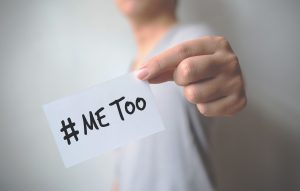
I was eleven when a sixteen-year-old male babysitter sexually molested me. He threatened, “I’ll cut your t**s off if you ever tell anyone what I am doing.” At age eighteen a physician casually ordered his nurse to leave the room so he would be free to sexually molest me in private. I was well into adulthood when I first shared about being abused because I had been intimidated to stay silent.
Speaking about our emotional trauma is vital to taking our life back from abuse. It is not easy to do. There are countless reasons why it is hard to speak about the abuse and mistreatment we experience. Certainly sexual abuse is a subject we just do not talk about for a number of reasons, one of which is the fear of not being believed.
When I spoke up about being sexually abused by a physician I was dismissed as just another woman he abused. Without a safe outlet to express what happened to me, I turned my frustration and anxiety inward. I developed deep rage at being forced to face mistreatment in silence and alone. That rage manifested in self-abuse and the abuse of others. But it was not only the sexual abuse that I was not comfortable sharing.
I was forced to sit in church year after year not able to question the religious dogma I was being indoctrinated to believe. I was not free to ask questions or express my views. I was not allowed to challenge the illogical and hurtful messages I heard.
When we cannot safely express our feelings we often turn that frustration inward. We harbor resentment, blame, anger, and feel unworthy. These emotions fester and can cause us to irresponsibly explode onto other people, often those who are closest to us, like a spouse or partner.
Being silenced about any abuse or being discounted in any way causes us to lose confidence in ourselves. Without speaking up we do not challenge the abusive behavior of others. We do not admit our self-abuse. We do not stand up for ourselves. We bury our emotions and feel invalidated and unworthy. We become co-dependent, abusive, or passive aggressive in our relationships. We do not feel safe to share our feelings with those we love. We do not ask for what we want in relationship. Yet, talking about our feelings, experiences, and needs is vital to creating emotionally intimate relationships. Including the relationship we have with ourselves.
It takes enormous courage and willpower to speak about the mistreatment we experience or witness. It takes determination to overcome the fear of being ridiculed or not taken seriously. However, to help ourselves heal, one of the most productive things we do is to acknowledge what we feel – anger, sadness, unworthiness, fear, or shame – by talking about the pain and bad memories because sharing allows us to find our voice again.
Sexual abuse. Psychological abuse. Ridicule. Bullying. Religious persecution. Intimidation. Isolation. Body image shaming. Guilt and coercion. Humiliation. Perfectionism. Abuse of authority. Restriction of individual expression. We do not choose to experience any of these abuses. But we can choose to overcome them.
The truth is, I am who I am today because of what I chose to overcome, not what I was subjected to. You are what you choose to overcome too. And believe me, you ARE strong enough to overcome anything. You just have to love yourself more than you were abused.
